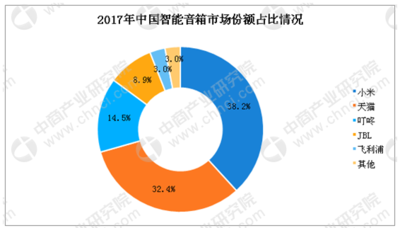Under the leadership of the development of artificial intelligence and Internet of Things technology, smart homes are booming. Internet giants and emerging startups are deploying from different perspectives such as hardware, technology, and system solutions, and smart home systems are beginning to appear. With the continuous improvement of artificial intelligence technology, the types of smart home products are increasing, and the music, interaction and home attributes of smart speakers make it an entry point.
Global smart speaker shipments
A few days ago, Canalys announced global smart speaker shipment data for the second quarter of 2018. The data shows that global smart speaker shipments in the second quarter of 2018 were 16.8 million units. Among them, Google's smart speaker shipments in the second quarter of 2018 were 5.4 million units, with a market share of 32.3%, ranking first on the list; Amazon Echo shipments ranked second, with shipments reaching 4.1 million units, and a market share of 32.3 %; Alibaba and Xiaomi rank third and fourth in the world, with shipments of 3 million and 2 million units respectively.
China's smart speaker industry is expected to explode
Smart speakers are the addition of intelligent functions on the basis of traditional speakers, which are mainly reflected in four aspects. First, it is technically equipped with WiFi connection function and can perform voice interaction; second, functionally, it can provide music, audiobooks and other content services , Third, provide Internet services such as information query, takeaway, and fourth, scenario-based smart home control capabilities.
Data shows that in 2017, the scale of China's smart speaker market will reach 200 million yuan, a growth rate of 46.8%; it is expected that by 2020, the sales scale of smart speakers will exceed 1 billion yuan. With the further optimization and upgrading of products and the promotion of smart homes, the potential of China's smart speaker consumer market will be released, and the industry is expected to usher in explosive growth.
In terms of sales volume, as the volume of smart speakers continues to increase, sales are growing rapidly. According to data, China's smart speaker sales in 2017 were 1.848 million units. It is estimated that China's smart speaker sales will reach 4,462,500 units in 2018, a growth rate of 141%. At present, the sales volume in the Chinese market is less than 10% of the international market, and the penetration rate is low. As Internet giants join the battle, the future market space is huge.

Xiaomi and Tmall carve up China's smart speaker market
According to the data, in 2017 China's smart speaker market share, Xiaomi ranked first with a market share of 38%; ranked second is Tmall, with a market share of 32% in 2017; ranked third is Dingdong, The market share accounted for 15%, followed by JBL and Philips, with market shares of 9% and 3% respectively.
The development prospects of smart speakers
1.Intelligence and voice interaction technology will become the core competitive technology of the industry
The essence of smart speakers is a voice interactive product. Voice interaction technology directly affects user experience. Intelligence and voice interaction technology may become the core competitive technology of the smart speaker industry.
2.Smart speaker industry chain expansion
With the development of smart speakers and the rapid increase in the downstream of the industrial chain, market practitioners need to realize the resource integration of hardware + technology + content + service through the expansion of the industrial chain or the form of cooperation, forming an ecological closed loop.
3.Smart speakers gradually become the control center of smart home
In the future, with the continuous maturity of smart voice technology, smart speakers will gradually replace smart phones in the convenience and experience of controlling smart homes. In the future, smart speakers will become the control center of smart homes. They can control smart home products by linking with smart TVs, lights, air conditioners and other smart devices, and using voice interaction.